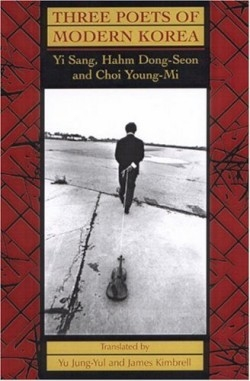Three Poets of Modern Korea
Yi Sang Hahm Dong-seon and Choi Young-mi
Most Americans’ images of Korea extend little further than Hyundais and demilitarized zones and vague stories about eating dogs. This book, which offers fairly generous samplings of three very different Korean poets, may help begin to ease our ignorance about the rich poetic culture of Korea-a country where, according to the translators’ introduction, poems are to be found everywhere.
The first, Yi Sang (1910-1936), wrote experimental poems that were, and remain, both widely known and controversial among Korean readers. Surreal, playful, and hermetic by turns, his work is both dazzling and engaging, perhaps reminiscent of some strange combination of Arthur Rimbaud, Andre Breton, and Frank O’Hara. (One hopes that the translations are faithful to the original, since Yu’s and Kimbrell’s versions of all three poets read very well as English poems.) Many of Yi’s poems, like the brief “Distance,” are in prose; it ends “My life is becoming better acquainted with this distance that resembles nothing so much as a disaster area.”
Hahm Dong Seon, born in 1930 in a city that is now part of North Korea, has lived most of his life in exile. His work is traditional, imagistic, reflective, with a nostalgic leaning that is tempered by anger at a history of violence: “When everything was done, / a quiet peace / Like cool moisture spreading across paper windows and doors / was the first and last pleasure under colonial reign.”
The youngest of these poets, Choi Young-mi, born in 1961, might be described as a granddaughter of Edna St. Vincent Millay-not that she writes sonnets, but that her poems have something of Millay’s slightly cheeky, slightly world-weary tone. “The light on our skin shrank us,” she writes in “Recollection of the Last Sex,” “we threw our clothes on as quick as cold scales / will stick to a body.”
The work of each of these poets is much more various and subtle than a review like this can detail. They offer much to delight and instruct, in poems that the translators have brought into English with grace and verve.
Disclosure: This article is not an endorsement, but a review. The publisher of this book provided free copies of the book to have their book reviewed by a professional reviewer. No fee was paid by the publisher for this review. Foreword Reviews only recommends books that we love. Foreword Magazine, Inc. is disclosing this in accordance with the Federal Trade Commission’s 16 CFR, Part 255.

